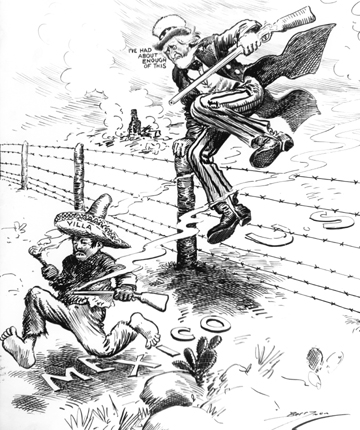What happens when a commanding general goes into the movie business?

This is a frame from one of the movies shot of Pancho Villa’s army. Soon after Villa signed his contract, another rebel commander signed his own movie deal for exclusive rights to film his branch of the army. War may be hell, but the movie business is really cutthroat.
In January of 1914, Mexican revolutionary Pancho Villa made headlines, not with a battle or a fiery speech, but with something very different: a movie contract.
Villa signed a $25,000 contract with Mutual Films giving them exclusive rights to cover his army. According to its terms, all other cameramen were banned from coming on Villa’s campaign, and the general was guaranteed a percentage of the gross.
All that without an agent.
Four cameramen were dispatched to join up with Villa’s army. The general obligingly held off an attack on the town of Ojinaga until they got there. He also agreed that if Mutual couldn’t get good enough pictures during actual battles, he would stage them.
Mutual decided to make a film about Villa’s life, and the general agreed to play himself—even though he was still leading an army in battle! Mutual felt Villa’s sloppy old clothes didn’t come across well on film, so they gave him a snappy new uniform he was happy to wear. When producers complained that executions at dawn were too hard to film, Villa moved the shootings to later in the day, when there was better light. A location manager’s dream.
One journalist called it “the war waged to make a movie.” In reality, it was Villa’s way of trying to finance his revolution—and generate some good PR. The general was portrayed in Mutual’s movies as a hero until his invasion of the U.S. in 1916. After that he became a first-class villain.
That’s showbiz.
“HOW WOULD YOU FEEL TO BE A PARTNER TO A MAN ENGAGED IN KILLING PEOPLE?”
— MUTUAL FILMS’ HARRY AITKEN, COMMENTING ON THE DEAL

Villa lost most of his support when he invaded the town of Columbus, New Mexico, in 1916, killing seventeen people. His goal was to prompt a U.S. invasion of Mexico that would anger Mexicans and inspire them to flock to his banner. It worked like a charm.